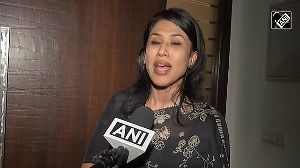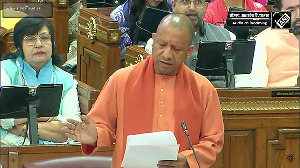If Sunday's Standard Chartered Mumbai International Marathon drew applause for its conduct from participants and sponsors alike, it was mainly because of one man: Bill Reynolds, the start and finish director for the event.
The 65-year-old Londoner, who is president of the British Association of Road Races, performed a similar role for the famous London Marathon in 1994. His job includes dealing with runners' code-of-conduct, rules and regulations. In a tete-e-tete with Harini Rana, Reynolds talks about all that goes into conducting a marathon.
It all started in London in 1994, the London Marathon. I was the start manager and managed everything to do with tracks, helping and team baggage.
As manager, it involves a lot of things. It takes over a span of a year organizing a marathon. There are too many times involved.
| |||||||||||
Two marathons are never the same. Marathons are always unique. There are various courses, set-ups; the environment of one marathon differs that of another.
The only difference that I would find between the Mumbai and New York marathon is that here [Mumbai] we have a circuit route while there was a straight A-B course in New York. The facilities are same though.
I have learnt new things here and will improve on them. It will be better next year.
So what does the Start and Finish Manager mean? Here comes the reply, very clearly. There is no mincing of words. I take care of everything at the start, when the participants run, and at the end point, when they return.
After the celebrities and ministers drop the flags, it is my job to align the elite runners for the Half and Full marathon ahead on the mass runners.
The banner in front of the elite runners is removed only when I indicate. Ten seconds before the time to move on I go on the left side and shoot an indicator for the participants to run. The same thing happened for the Dream Run, which started later, after the main marathon.
At the finish line, I have to look at the runners' position, timings. Also we were using 'Champion Chips', which needed to be taken off the shoes. It is a very important position, as I have to get the time correct. It is quite nerve-wracking at the start, as the finish is gradual.
The Mumbai Marathon was a new experience. It was wonderful and marvelous working with people in the city. They are very dedicated in their work, though there are quite a few things that work very differently in India. When the meeting is supposed to start at 10 it does not begin before 11:30. This is one of the problems that I faced.







 © 2025
© 2025